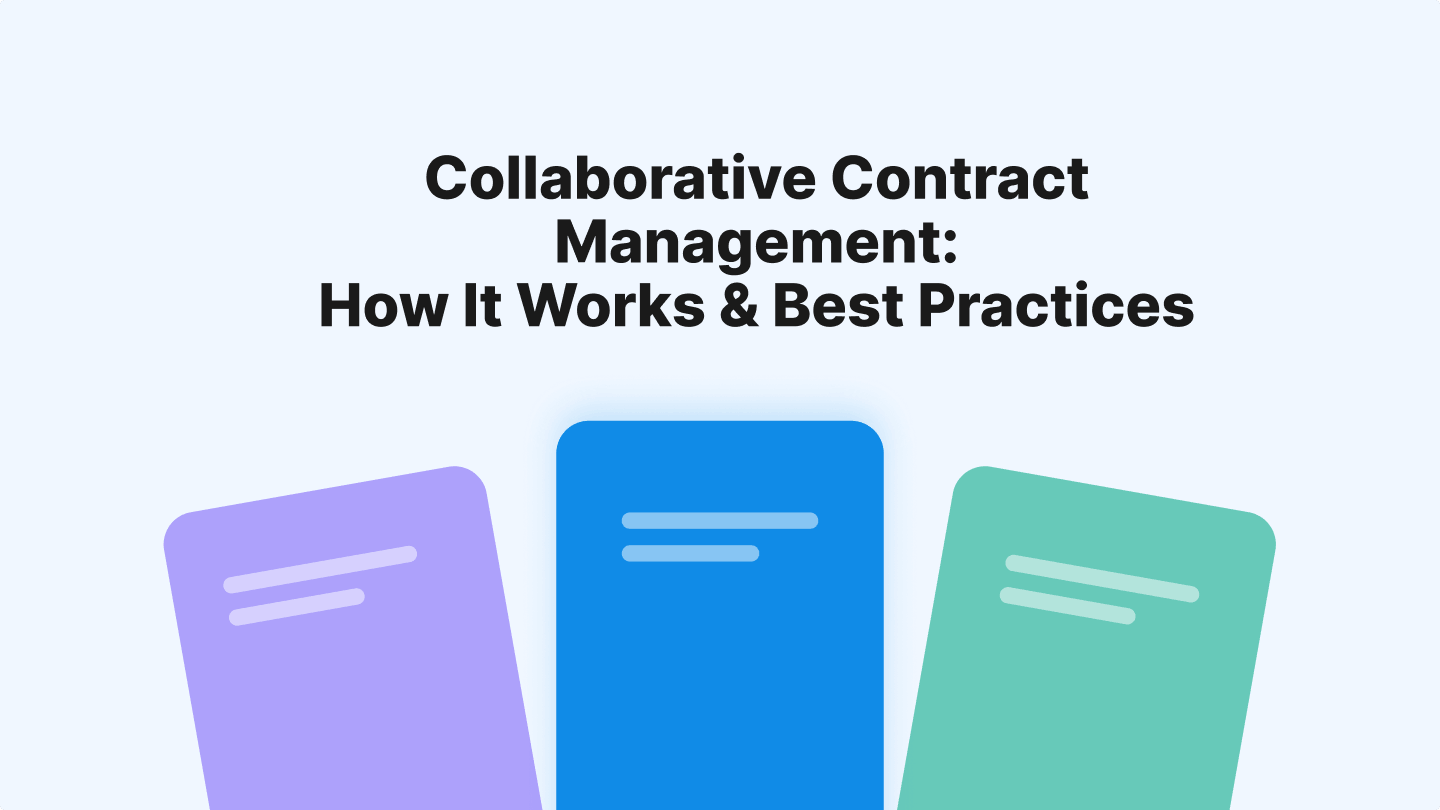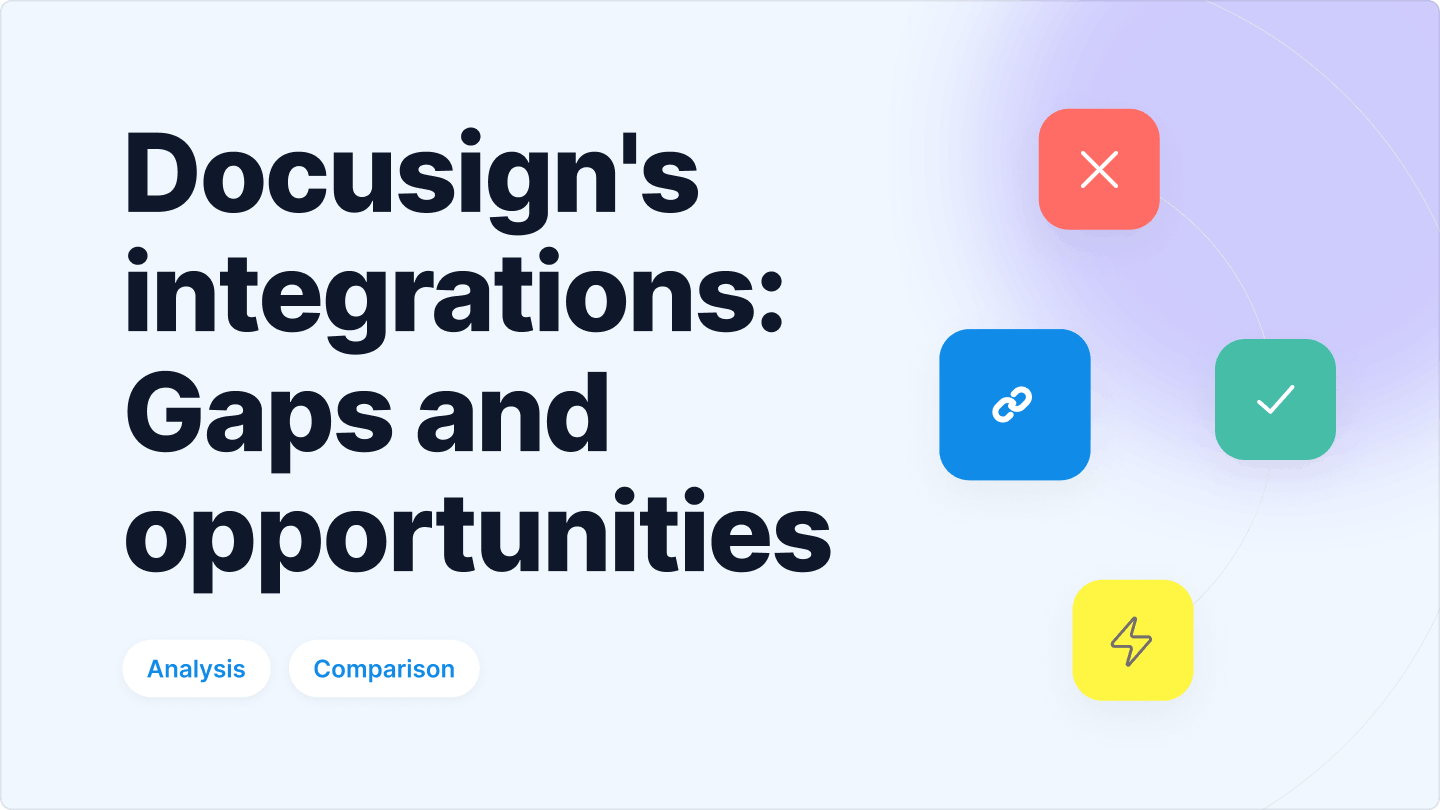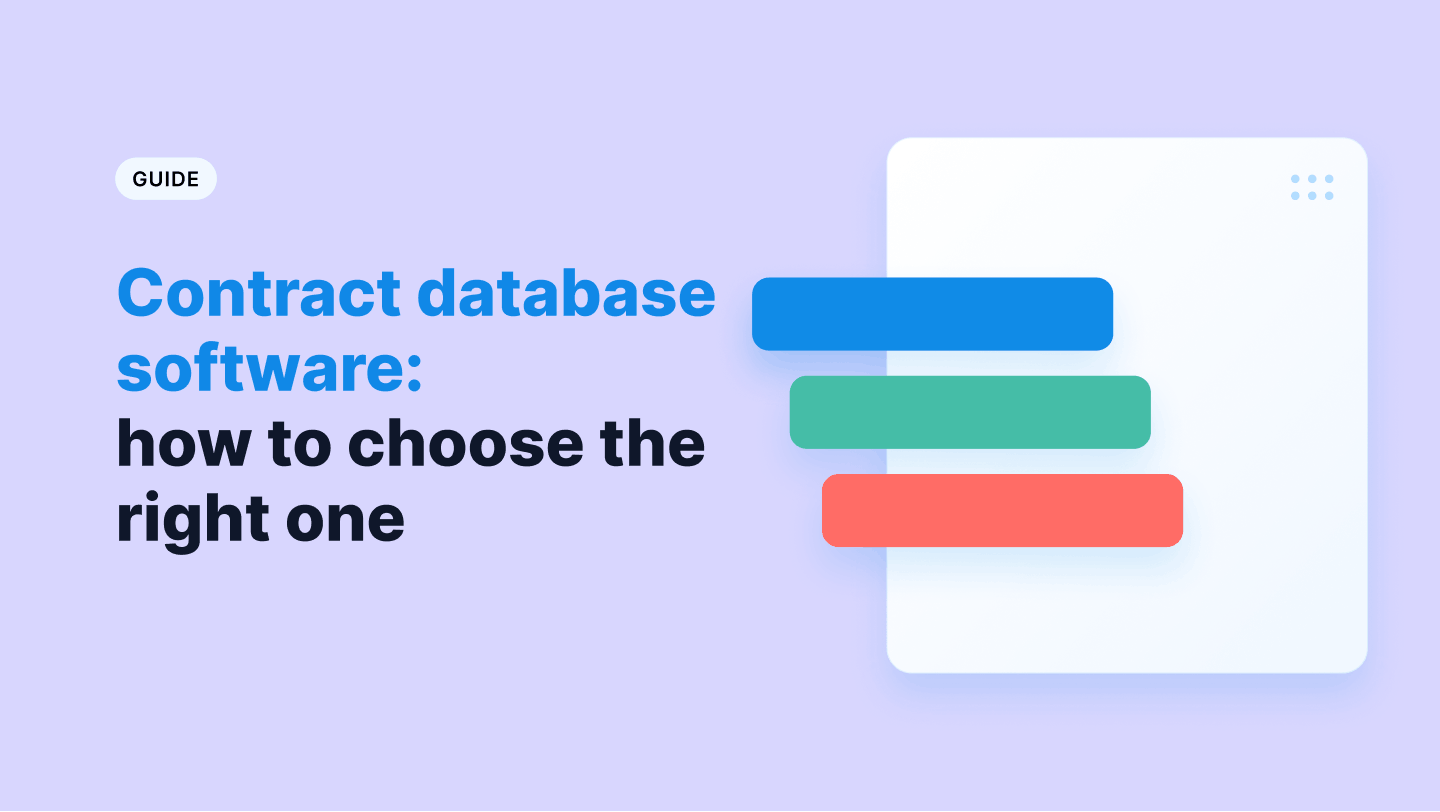DigiSigner positions itself as the affordable eSignature tool. It is simple to use and easy on the budget. Most DigiSigner reviews (with an average rating of 4.7 on G2 and 4.8 on Capterra) reflect good value for its users.
However, the tool does not work for everyone. When stacked against a more complete solution like Signeasy, DigiSigner shows its limitations. It offers limited advanced features and scalability.
And in this DigiSigner review 2026, you will learn:
- What DigiSigner is and its key features
- Its pricing plans with a detailed breakdown
- If the tool is easy to onboard and user-friendly
- Pros and cons of using DigiSigner
- How it compares to Signeasy
Let's get started.
What is DigiSigner?
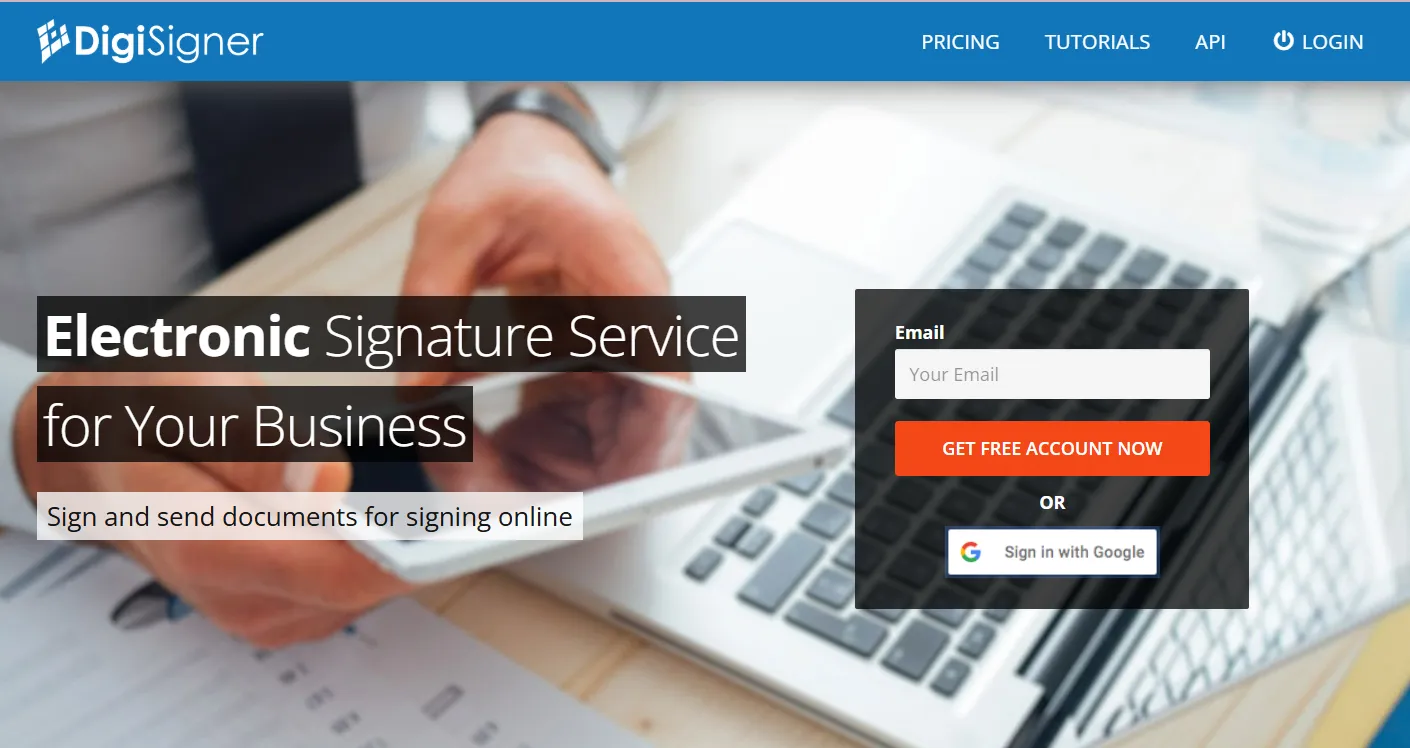
DigiSigner is a cloud-based eSignature tool that offers a simple way to sign and send documents online. It focuses on simplicity rather than an extensive feature set. This focus makes it ideal for individuals, freelancers, and SMBs that have basic signing needs.
The platform offers the following core use cases:
- Signing contracts with clients or vendors
- Preparing and signing Non-Disclosure Agreements (NDAs)
- Handling HR paperwork like offer letters and employee agreements
- Finalizing business agreements without the hassle of printing or scanning
DigiSigner supports common file types, such as PDF and Word, and offers legal eSigns under standards like ESIGN, UETA, and eIDAS. It also comes with a clean UI and low pricing, making it the go-to choice for budget-conscious users.
That being said, DigiSigner pales in comparison with feature-rich alternatives like Signeasy, which offers bulk sending, deep integrations, and custom workflows.
Learn More: The best 10 electronic signature software in 2026
DigiSigner features: A closer look
Of course, the core focus of eSignature tools is their digital sign workflows. But it is vital to assess elements such as compliance, ease of document handling, reusable workflows, and team collaboration to pick the right tool.
Let's check the key features offered by DigiSigner and what users are saying about them.
1. eSignatures and compliance
DigiSigner provides legally binding signatures that comply with ESIGN, UETA, HIPAA, and eIDAS regulations.
This ensures that signed documents are enforceable across the US and EU. The legality also makes users confident in their agreements as they hold legal weight without extra verification steps.
It also helps save time, cost, and effort for teams and businesses.
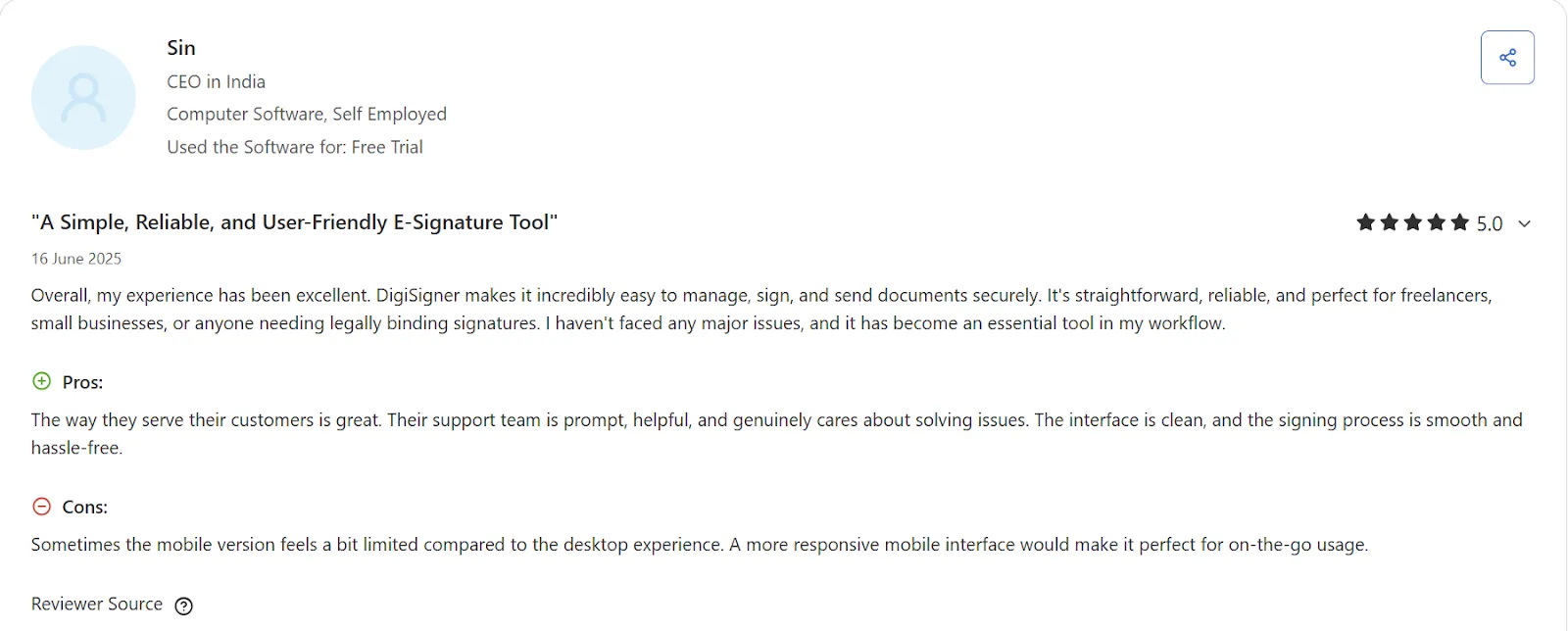
2. Document upload and signing
Users can upload PDFs, Word files, and other common formats to sign directly within the platform.
The signing process is simple without any extra software, and recipients can access documents through a browser.
All these make it quick to collect signatures without technical barriers.

3. Contract and agreement templates
To create a template in DigiSigner, users first upload a document — such as an NDA or contract. They can then add signature, date, and name fields to customize it as needed.
Once saved, the document becomes a reusable template that saves time and reduces repetitive work.
This feature is especially useful for small businesses that frequently handle similar paperwork.
4. Team management: Shared documents, multi-user support
DigiSigner supports multiple users for document sharing and collaborative signing.
Team members can access shared files, track progress, and streamline workflows. While helpful, this feature is more basic compared to the advanced team dashboards offered by competitors, like Signeasy.
Even then, you need to be on the team plan to be able to use the team management features.
5. Security and audit trails
DigiSigner takes the security of the documents very seriously and uses SSL (Secure Sockets Layer) encryption to secure documents in storage and transit. In addition, DigiSigner complies with major eSign laws like ESIGN, UETA, HIPAA, and eIDAS. All documents are also digitally signed to avoid any malicious modifications to the document.
Each signed document comes with an audit trail showing who signed, when, and from where. This helps businesses trace any issues back to the origin quickly and address them before they escalate or cause legal concerns.
Feature-by-feature comparison table: DigiSigner vs. Signeasy
Here is a quick comparison between the features of DigiSigner with Signeasy to see how the platforms fare with each other:
DigiSigner pricing and plans: A detailed breakdown
Pricing is often where eSign tools show what’s really under the hood. Some platforms bury you in hidden fees or lock essential features behind enterprise tiers.
But DigiSigner takes a different route. Its pricing is straightforward, easy to understand, and budget-friendly.
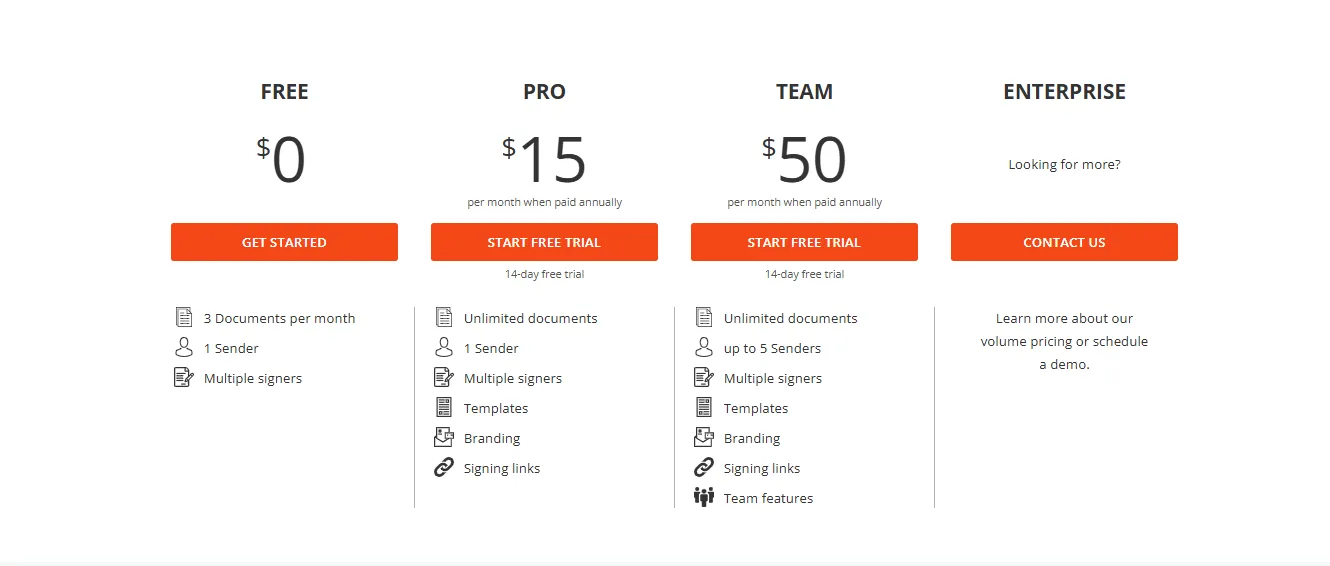
Here is a closer look at the pricing and plans of DigiSigner:
1. Free plan
DigiSigner’s Free plan is a good entry point if you only need occasional signatures.
It allows up to three documents per month and supports basic signing features. You can upload PDFs and Word files, collect signatures, and download signed documents at no cost.
And the biggest advantage is that it offers multiple signers. However, it comes with many limitations, such as:
- No templates
- Single sender
- No integrations
- No team features

2. Pro plan
The Pro plan starts at around $15/month per user with annual billing. With monthly billing, it costs $25/month.
This plan removes the document cap and adds unlimited signing, templates, and faster workflows. Hence, it is ideal for individuals or freelancers who handle contracts regularly.
3. Team and enterprise plans
For growing teams, DigiSigner offers Team plans ($50/month (annual plan) for up to 5 users). If you prefer to go with the monthly plan, the cost is $75/month.
The plan gets a huge upgrade of senders up to 5 and with team features. The other features remain the same as the Pro plan.
While DigiSigner offers a customized Enterprise plan, its details are unavailable. You can contact their sales teams for more details.
4. Cost comparison with other eSign solutions
DigiSigner is cheaper but limited in features, support, integrations, and more. This is more apparent when we compare its pricing plans with similar tools.
Let's take the pricing plans of Signeasy, for example. They include unlimited documents, bulk send, mobile apps, and deeper integrations.
While the plans are priced higher than those of DigiSigner, it makes sense given all the advanced features and capabilities that Signeasy offers.
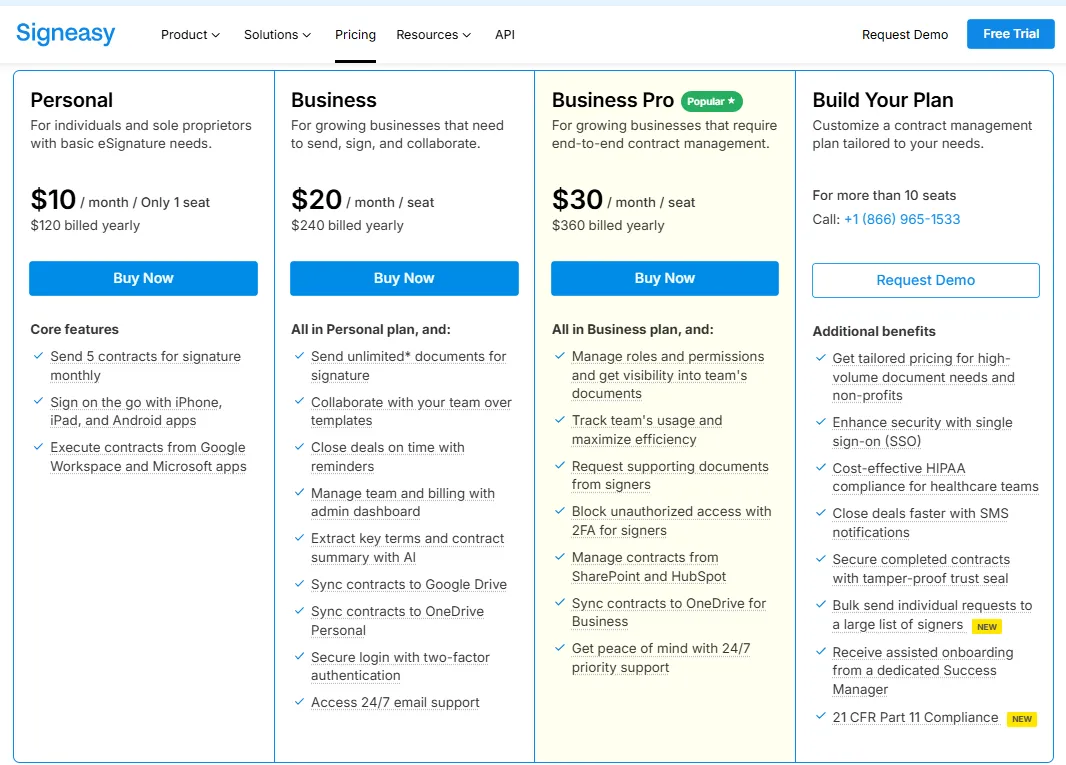
Here is a detailed comparison of pricing plans of DigiSigner vs Signeasy on annual billing:
1. DigiSigner vs Signeasy: Free plan
DigiSigner offers a free plan with features, such as 3 documents per month, 1 sender, multiple signers.
Signeasy's free plan comes with a limit of three documents per month, which is the same as DigiSigner.
While DigiSigner does not have a personal plan, Signeasy has one which is available at $10/user/month. It is ideal for individuals who need a simple and inexpensive way to send and sign documents.
The plan also includes the following features:
- Send up to five documents for signing via email each month
- Add stamps, timestamps, and signer IDs for verification
- Support for all major file formats
- Option to protect documents with passwords
- Ability to self-sign and edit signer details
2. DigiSigner Pro vs. Signeasy Business
DigiSigner’s Pro plan, priced at $15 per month, offers unlimited signing. It also comes with:
- Basic templates
- Simple branding options
- Signing links to share files easily
Simply put, you can have a simple and affordable plan that focuses on core eSign features.
But Signeasy’s Business plan, at $20 per month per seat, takes things a step further and offers:
- Unlimited documents that you can send for signing in over 25 formats, such as PDF, Excel, PNG, JPG, Word, Pages, etc., and access it whenever needed. You can also add signature to word document files directly within Signeasy.
- Team collaboration to work on standardizing contracts, minimizing errors, and saving time with up to 5 reusable contracts. You can also share them with your team or create public links to collect signatures from multiple recipients.
- Built-in reminders that get sent on day one and day seven to ensure your contract workflows move ahead as planned. You can also send manual reminders if needed to avoid delays.
- Diverse integrations with platforms, like Google Drive, Gmail, Google Sheets, Google Docs, Microsoft Teams, and Microsoft Outlook to store and share documents.
- An admin dashboard to help you easily invite, manage, and collaborate with your team members and handle billing effortlessly within the dashboard.
Apart from this, you can also get AI features to summarize contracts and surface key terms instantly.
3. DigiSigner Team vs. Signeasy Business Pro
In its Team plan, DigiSigner is available for $50 per month for up to five users on annual billing. This makes it ideal for small teams that need shared access to contracts.
You can get the following capabilities with the DigiSigner Team plan:
- Unlimited documents
- Templates
- branding
- Basic admin visibility
While you may find the setup simple and affordable, it is limited in permissions, integrations, and workflows.
However, Signeasy’s Business Pro plan, at $30 per month per seat, solves these issues right off the bat. That's why it is ideal for mid-sized teams managing multiple senders and departments.
You get access to diverse eSign and contract management features, such as:
- Usage tracking that lets you track team usage, monitor contract stages, download or share reports to maximize team performance and efficiency.
- Role-based permission to manage your team effectively and view documents, access document analytics, and ensure control of the team’s documents.
- Integrations with tools like SharePoint and HubSpot to send, track, and manage your documents within your favorite platforms and save time.
- Two-factor authentication for signers to ensure extra security with every document sent and only verifies signers can access the documents.
- 24/7 priority support for instant help to resolve any issues you face efficiently regardless of when you face these issues.
The DigiSigner Team plan keeps things light and easy. But Signeasy Business Pro gives growing businesses the visibility and control they need at scale.
Apart from this, both platforms offer API pricing plans, as given below:
4. DigiSigner vs Signeasy: API pricing plans
DigiSigner offers the API at $.05 per document.
On the other hand, Signeasy offers four API pricing plans as given in the image below:
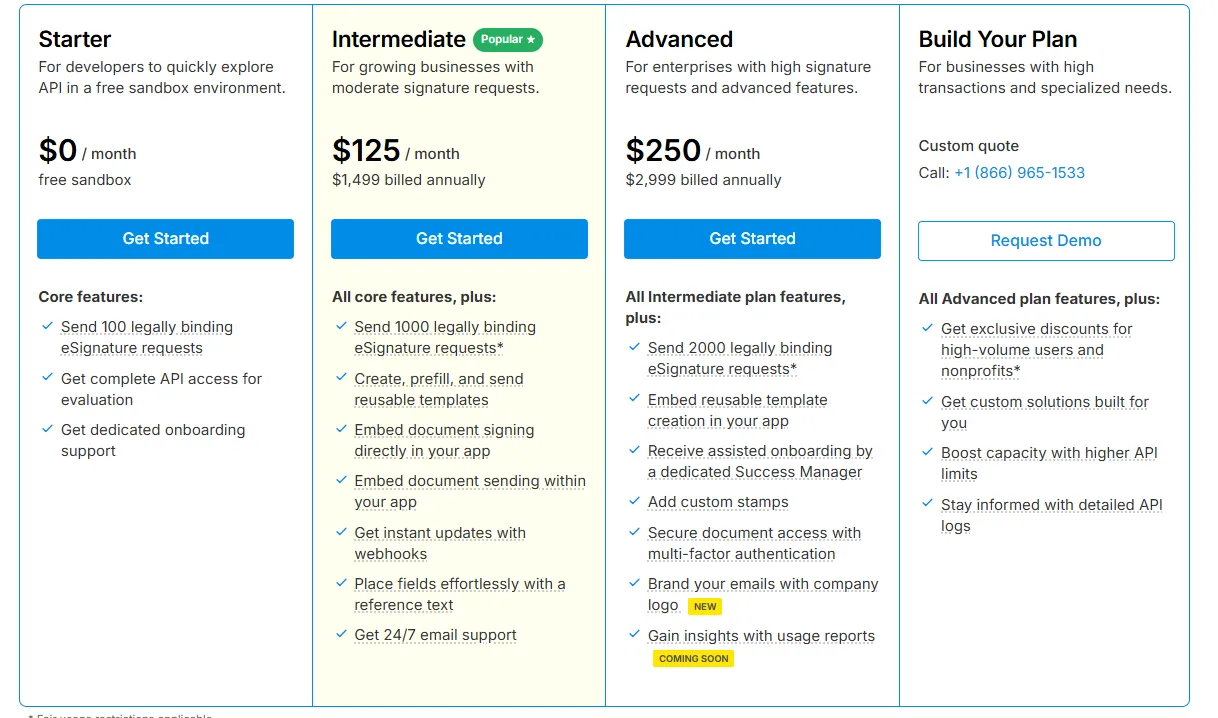
Signeasy’s AI plans are ideal for businesses that are scaling rapidly. The platform offers four different API plans:
- Starter: Free plan that is ideal for developers who want to explore API in a free sandbox environment.
- Intermediate: The plan costs $125/month ($1,499 billed annually) and is ideal for growing businesses with moderate signature requests.
- Advanced: This plan is available for $250/month ($2,999 billed annually) and is ideal for enterprises with high signature requests and advanced features.
- Build Your Plan: This allows you to build custom plans and is suitable for businesses that have high transactions and unique needs.
5. DigiSigner Enterprise vs. Signeasy Enterprise
For larger organizations, DigiSigner offers a custom-priced Enterprise plan. But the details of the features and plan are not listed on the site. This may make users sceptical about contacting the team plan details are unavailable.
But, Signeasy’s Enterprise plan has all the details you need right on the pricing page. Signeasy makes it clear that the plan is ideal for teams that want 10+ seats.
Besides the features available on other plans, the Enterprise plan offers:
- Single sign-on (SSO) that lets you integrate with your preferred identity provider for better security, user management, and productivity.
- 21 CFR Part 11 compliance to ensure eSigns and electronic documents meet the FDA requirements for life sciences and FDA-regulated industries.
- HIPAA compliance to ensure the healthcare data is handled carefully and securely for patient privacy and business integrity.
- Instant SMS notifications to recipients to inform them of pending documents, instead of via emails.
- Dedicated Success Manager for onboarding and support to improve your experience with setting up and using Signeasy for faster ROI.
Signeasy's Enterprise plan shows who it is ideal for, making it easier for teams to decide if they should go ahead with it. This takes the guesswork away, unlike in the case of DigiSigner's Enterprise plan.
6. Free trial availability
DigiSigner offers a 14-day free trial. The free trial is available with both the Pro and Team plans. You can use the free trial to check the suitability of the plan and decide to continue or terminate the arrangement.
Likewise, Signeasy also offers a 14-day free trial. You can sign up for the same without a credit card and get a 100-day money-back guarantee, as well.
Ease of use: Is DigiSigner user-friendly?
eSign tools only help if people can actually use them easily without much training. DigiSigner keeps things refreshingly simple without clutter or confusion. In fact, this simplicity is what makes it a go-to choice for many small businesses and freelancers.
Here’s how it performs when it comes to setup, usability, and learning curve.
1. Setup and onboarding
DigiSigner’s setup is quick and straightforward. You can create an account, upload a document, and send it for signature within minutes.
There’s no complicated configuration or training needed. This simplicity makes it approachable for freelancers and small teams.
And it is lauded by its users on review platforms, like G2, with reviews like the one below:
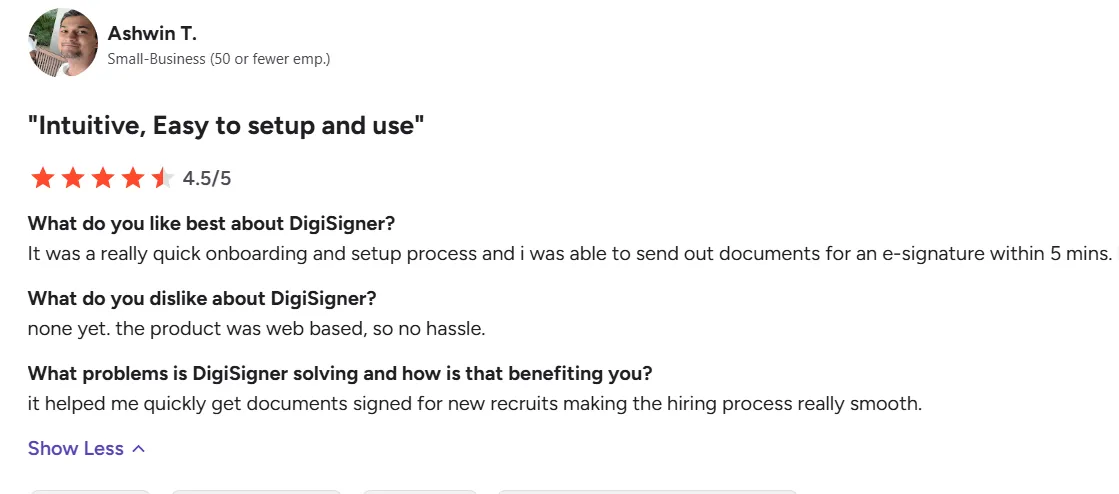
Source
However, the onboarding resources are basic with limited guides and a short tutorial. So teams scaling up might find support a bit thin.
2. Web and mobile experience
On desktops, DigiSigner feels clean and minimal. Documents upload fast, and signing is intuitive.
But it drops the ball when it comes to the mobile experience. There is no dedicated app, but a browser-based app. Although it gets the job done, it lacks the polish and responsiveness of native mobile tools.
This is constantly pointed out as a challenge of using the app, on many reviews, like the one below:
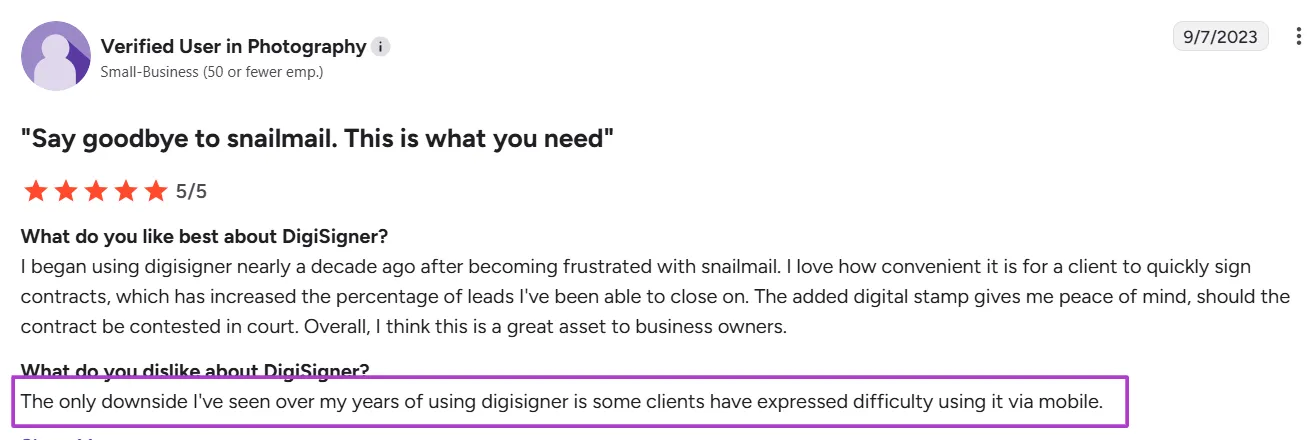
Source
3. Learning curve
The learning curve is gentle. Users can get familiar with the interface in a single session. Most features are visible and self-explanatory, but deeper customization options are missing.
This is one area where DigiSigner gets the most love from its users, as evident in the review below:
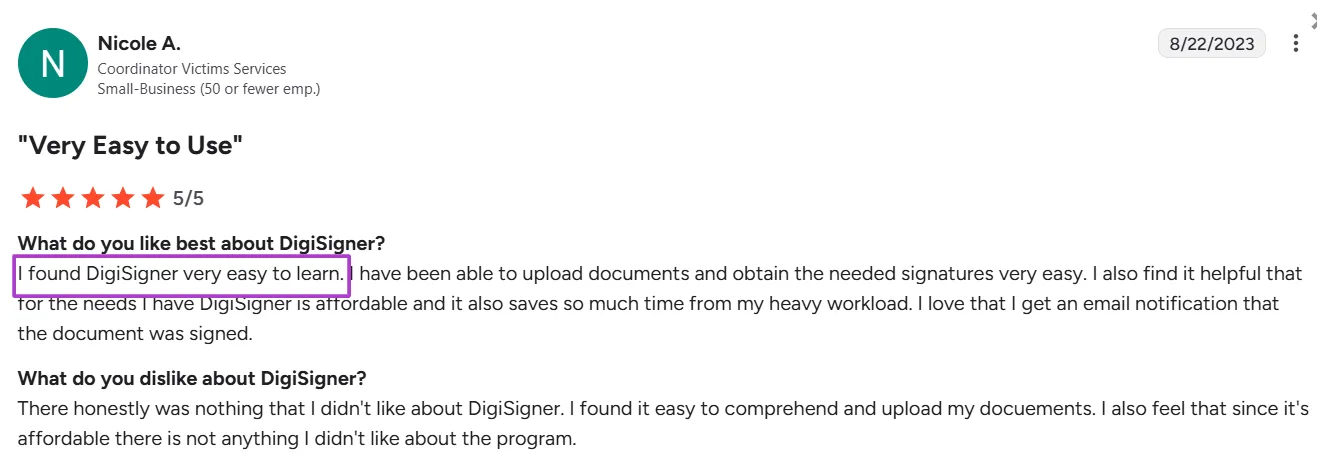
Source
Pros and cons of DigiSigner
Like most tools, DigiSigner has its strengths and blind spots. It is simple, reliable, and affordable.

Source
But it does not do everything. Depending on what you need, that can be either refreshing or a little limiting.

Source
Here’s where it stands out and where it falls short.
Unlike DigiSigner, Signeasy meets a broader set of compliance requirements such as ESIGN, UETA, eIDAS, SOC 2 Type 2, GDPR, HIPAA, and 21 CFR Part 11 — making it suitable for regulated industries.
How does DigiSigner compare to Signeasy?
DigiSigner and Signeasy both promise fast, paperless signing. But they cater to different kinds of users.
DigiSigner keeps things lean and affordable, while Signeasy is a contract management platform, offering advanced features for eSignatures and document management for scaling teams from mid-market and enterprise businesses.
Here’s how the two stack up across features, pricing, usability, and audience fit.
1. Features
As a simple eSignature tool, you can see DigiSigner handling the basics well. You can upload, sign, and share documents quite easily.
But the tool's offering pretty much stops there. On the contrary, Signeasy goes a lot further as a full-feature CLM platform with automation, integrations, intelligent contract repository, and robust AI features through Signeasy AI.
Let’s compare them both in detail here:
a. Scope of functionality
DigiSigner covers basic eSign needs.
Signeasy streamlines the entire contract lifecycle — from drafting, routing, and signing to storage, tracking, and analytics. With Signeasy, you can also automate approval workflows and use Signeasy AI to create contract summaries for faster reviews.
b. Workflow automation
Signeasy automates repetitive contract processes, including approvals and renewals. The automation saves mid-market and enterprise teams that handle numerous documents hours of manual work. DigiSigner lacks such automation.
c. Integrations
DigiSigner connects with only a few apps, such as Google Docs. However, Signeasy integrates with major business tools such as Google Workspace, Microsoft OneDrive, HubSpot, and Microsoft Teams to unify workflows.
As these tools are often used by mid-market and enterprise businesses, Signeasy becomes the go-to CLM platform for them.
d. Security and compliance
When it comes to security and compliance, both tools comply with ESIGN, UETA, eIDAS, and HIPAA. But Signeasy adds SOC 2, GDPR, and role-based access controls for enterprise-grade security.
Signeasy also offers two-factor authentication for signers to enhance security and ensures 21 CFR Part 11 compliance for meeting FDA requirements.
e. Mobile accessibility
DigiSigner depends solely on browsers. Signeasy offers dedicated iOS and Android apps that enable users to create, track, and manage contracts on the go.
It is also available on tablets, making it ideal for industries such as healthcare and real estate.
f. Scalability
DigiSigner works well for freelancers and small teams. Signeasy is built for scaling mid-market and enterprise teams that need advanced document control and visibility.
Signeasy's Business Pro and custom plans are designed to meet the growing needs of enterprises that manage large volumes of documents.
g. Collaboration and reporting
Signeasy includes centralized dashboards and audit trails that help leaders gain insights into contract status and performance.
It offers an admin dashboard that lets you easily invite and collaborate with your team members.
Signeasy's intelligent contract repository makes analytics and insight generation easy. This allows you to transform your static documents and contracts into revenue-generating assets.
DigiSigner fails to deliver on this front.
Learn More: 7 Benefits of Using eSignature for Healthcare
2. Pricing transparency
DigiSigner’s pricing is direct up to the Enterprise plan, where details vanish behind a 'Contact Us' button. That lack of clarity makes it harder for buyers to know what they’re getting.
Signeasy clearly lists every tier, feature, and compliance option. This means teams can compare and plan without surprises.
3. Ease of implementation and adoption
Both tools are easy to set up, but Signeasy’s onboarding, tutorials, and app ecosystem make it smoother for teams to roll out organization-wide.
DigiSigner works fine for individual users, but feels basic for collaborative setups.
However, when compared to DigiSigner, Signeasy may take longer to implement and adopt due to the advanced features it offers.
4. Ideal user segments
DigiSigner fits freelancers or small teams that just need reliable, affordable signing. Signeasy is better for mid-sized businesses and enterprises that need advanced controls, security, and integrations without a steep learning curve.
However, Signeasy is also suitable for small businesses that have limited eSign needs thanks to its Personal plan.
Customer support and resources
DigiSigner keeps customer support simple. Most issues can be handled through email or its escalation option.
The platform offers support mainly through the following:
- Learning center
- Support center
- Tutorials
They cover common questions about signing, account setup, and billing. The product guides are helpful but fairly short. And they are good for quick fixes, but not so much for complex team setups.
The responsive customer support is rated positively by many users on platforms like G2, as given in the following review:

Source
In contrast, Signeasy offers 24/7 email support, priority assistance on higher plans. It also comes with detailed documentation for admins rolling out company-wide workflows.
Here is what Julee P., a Lead Educational Diagnostician from a small business has to say about their positive experience with Signeasy's customer support on their G2 review:
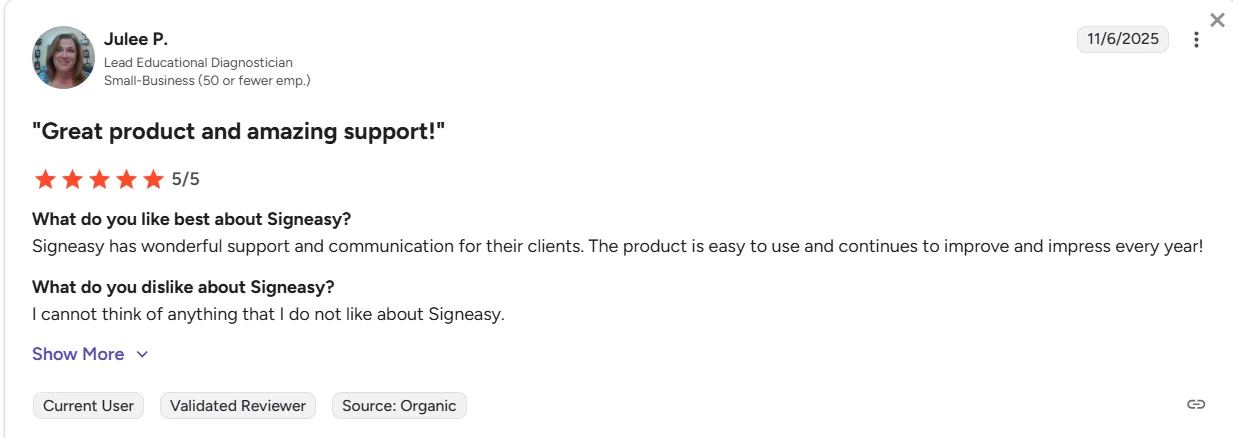
Source
Signeasy's learning resources include webinars, tutorials, and video demos. And they make it easier for teams to onboard.
Who is DigiSigner best suited for?
From this review, one thing was pretty clear to use: DigiSigner is not trying to be everything to everyone.
It shines for people who want straightforward eSigning without the noise and value simplicity, affordability, and minimal setup time.
1. Freelancers and small businesses
DigiSigner is perfect for freelancers, consultants, and small companies that send a few contracts a week.
There are three key reasons for this observation, such as:
- DigiSigner is affordable.
- It is legally compliant.
- Anyone can use it without much training.
The platform lets small businesses and freelancers handle most of the common documents they use, such as NDAs (here's a helpful guide on nda meaning), proposals, and client agreements.
2. Mid-sized teams and enterprises
While the platform offers business and enterprise plans, they come short of what mid-sized teams and enterprises may need.
It lacks several features, such as:
- Bulk send for faster document processing.
- AI capabilities to save time and improve efficiency.
- Deep integrations to manage high document volumes.
- Admin controls to ensure efficient contract management.
As such, large businesses may find tools like Signeasy fit better with automation, role-based access, AI summaries, custom workflows, and templates.
3. Industry-specific use cases
DigiSigner suits businesses that deal with repetitive, low-risk paperwork. This is often ideal for tasks like HR onboarding, vendor contracts, and NDAs for legal, real estate, human resources, and small businesses.
However, Signeasy is ideal for a range of industries, including the following:
- Healthcare: Signeasy streamlines patient consent, insurance forms, and vendor contracts with HIPAA-compliant eSignatures and secure document management.
- Education: Schools and universities use Signeasy to manage admission forms, staff onboarding, and partnership agreements digitally to reduce paperwork and improve approval turnaround times.
- Real Estate: You can accelerate property transactions by enabling agents, buyers, and sellers to securely sign agreements anytime for faster deal closures and better client experience.
- Construction: Construction firms use Signeasy to handle subcontractor agreements, compliance documents, and change orders for transparent and timely approvals.
- Banking and Finance: You can enhance compliance and speed in loan processing, client onboarding, and internal approvals with Signeasy.
All these capabilities make Signeasy a better contract management platform for mid-market and enterprise businesses instead of Digisign.
Signeasy for modern contract management
DigiSigner is an ideal solution for individuals and small teams that need to sign and send documents quickly. It is affordable, easy to use, and legally compliant. All these factors help it earn positive reviews and a respectable rating.
However, once you start handling larger volumes or more users, the gaps become clear. The solution is hard to scale and lacks even common advanced features, such as eSign workflows and advanced security.
While DigiSigner drops the ball there, Signeasy stands out as a stronger alternative with enterprise-level eSignature and contract management features
It comes off as a scalable option with features designed for growth:
- AI for automated notifications and summaries
- Advanced templates and automation workflows
- Enterprise-grade security (SOC 2, HIPAA, GDPR)
- Bulk send, reminders, and smart document tracking
- Deep integrations with Google Workspace, HubSpot, and Teams
Using Signeasy, you can save about 80% of contract processing time, just like SOHAR Port and Freezone in Oman.
If you wish to explore the platform in detail, request a Signeasy demo and simplify your document workflows from day one.










